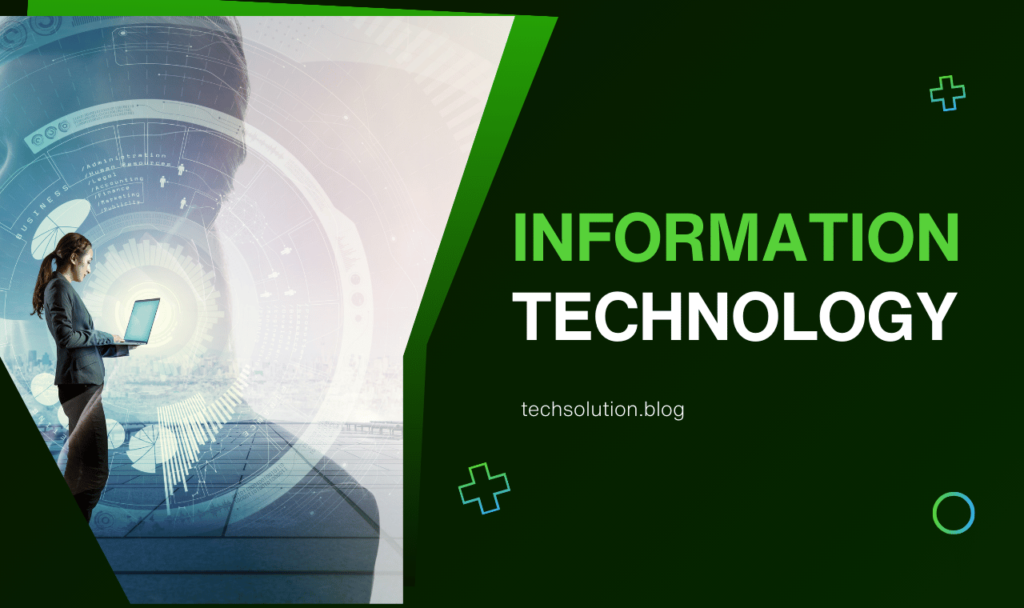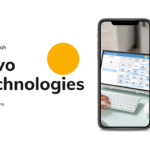Are you ready for a deeper dive into the world of information technology (IT)? When it comes to the digital age we live in, IT has become the backbone of nearly every sector, shaping our daily lives and revolutionizing how businesses and individuals function. But what do you really know about IT?
What Is Information Technology?
Information technology (IT) uses computers, networks, storage, and other physical devices to process, manage, and store data. The term encompasses various systems, services, and software designed to streamline business operations and personal activities. It isn’t just about computers—it’s about creating and managing systems that support communication, innovation, and data handling. It enables us to stay connected and efficient from cloud computing to cybersecurity.
Information technology’s role has become increasingly critical, driving advancements in every industry, from education to healthcare and finance. In essence, IT ensures that data is accessible, usable, and secure. Whether it’s through mobile apps, web-based platforms, or large-scale databases, IT professionals ensure that our digital lives run smoothly.
Additionally, IT is key in enhancing communication, driving innovation, and automating processes. Whether it’s artificial intelligence (AI), machine learning (ML), or big data analytics, the potential of IT is expanding. With cloud computing making resources more accessible and cybersecurity measures safeguarding sensitive information, the future of Edmonton IT is bright and essential to progress.
What Best Defines Information Technology?
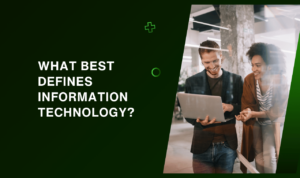
The best definition of information technology lies in its ability to harness computational systems to solve problems, enhance communication, and store data. IT is not limited to just computers but encompasses various technologies, including telecommunications, software development, network administration, and even hardware maintenance. It is about creating an interconnected system where data can flow smoothly, safely, and efficiently.
IT’s purpose is to develop systems and ensure they function seamlessly. IT professionals specialize in maintaining systems, developing new applications, and implementing innovations that keep companies at the forefront of their industries. IT is about leveraging technology to improve productivity, communication, and security.
The Concept of IT: From Infrastructure to Innovation
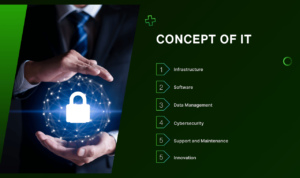
The concept of IT is broad and multifaceted. At its core, IT can be broken down into several key areas:
- Infrastructure: This involves the physical hardware, such as servers, computers, and networks, that provide the foundation for IT services. The infrastructure is crucial for the operation of software and services.
- Software: This includes the programs and applications that run on computers and devices, enabling users to perform tasks efficiently. IT departments often manage and maintain this software to ensure it is up-to-date and secure.
- Data Management: IT is heavily involved in collecting, storing, and analyzing data. Effective data management is vital for companies to make informed decisions and ensure data is secure and accessible.
- Cybersecurity: Protecting data and systems from breaches, viruses, and other threats is essential to IT. IT teams implement security protocols to prevent unauthorized access and protect sensitive data.
- Support and Maintenance: IT professionals provide ongoing support to ensure that all systems run smoothly. This includes troubleshooting technical issues, upgrading systems, and offering user support.
- Innovation: With the rise of emerging technologies such as AI, blockchain, and cloud computing, IT continues to evolve. Innovation within IT drives progress in various industries, allowing businesses to remain competitive and forward-thinking.
Basic Knowledge of IT
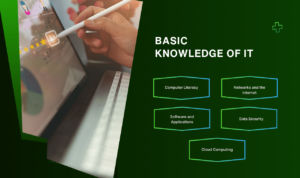
Understanding the basics of IT is essential for both professionals and casual users. Here are some fundamental concepts:
- Computer Literacy: Being comfortable with basic computer tasks, such as using word processors, spreadsheets, and browsers, is the foundation of IT knowledge.
- Networks and the Internet: Familiarity with how computers connect to each other through networks and how the Internet functions is crucial. Networking allows data to be transferred between devices, enabling communication on a global scale.
- Software and Applications: Understanding how to install, update, and troubleshoot software is a core IT skill. Whether it’s for personal use or within a corporate environment, managing software is part of daily IT operations.
- Data Security: Knowing how to protect personal information and maintain security online is increasingly important. As cyber threats grow, IT literacy must include awareness of safeguarding sensitive data.
- Cloud Computing: The ability to use and understand cloud services is becoming vital in today’s digital environment. Cloud platforms allow data and resources to be stored and accessed from anywhere, offering flexibility and scalability.
Communication in Information Technology
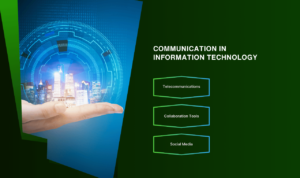
Communication is an essential element of IT. In many ways, IT professionals are facilitators of communication, enabling people and businesses to connect through various digital platforms. IT systems are the backbone of modern communication, Whether through email, social media, or video conferencing.
- Telecommunications: IT powers the telecommunication systems that enable people to communicate across vast distances. IT is behind every phone call or video chat, from cell phones to VoIP services.
- Collaboration Tools: Platforms like Slack, Microsoft Teams, and Zoom have transformed how businesses communicate internally. These tools allow teams to collaborate in real-time, regardless of physical location.
- Social Media: IT underpins social media platforms, enabling users to connect, share content, and engage with one another. Without IT, social networks like Facebook, Twitter, or LinkedIn wouldn’t be impossible.
Information Systems vs Information Technology vs Computer Science
Category |
Information Systems (IS) |
Information Technology (IT) |
Computer Science (CS) |
| Definition | The study of how people, data, and processes interact to support organizational decision-making. | The practical application of technology to manage and process information through hardware, software, networks, and databases. | The theoretical and mathematical study of computing, algorithms, and software development. |
| Focus | Focuses on integrating technology with business processes and ensuring the effective management of data. | Focuses on implementing and maintaining technology systems to support business operations and problem-solving. | Focuses on understanding computing principles and developing new algorithms and software. |
| Main Tasks | Designing and managing information systems, analyzing business needs, and aligning IT with organizational goals. | Managing IT infrastructure, implementing security measures, and ensuring system efficiency. | Designing and developing algorithms, writing software, and solving computational problems. |
| Key Skills | Business analysis, project management, systems analysis, database management. | System administration, network management, cybersecurity, software installation, and troubleshooting. | Programming, algorithm design, computational theory, and software development. |
| Career Paths | Systems analyst, business analyst, IT consultant, and database manager. | IT support specialist, network administrator, cybersecurity expert, IT manager. | Software developer, data scientist, computer engineer, AI/ML researcher. |
| Typical Courses | Business analysis, database management, systems design, and project management. | Networking, hardware support, system administration, cybersecurity. | Programming languages, data structures, algorithms, and operating systems. |
| Primary Tools | Enterprise Resource Planning (ERP) systems, databases, and project management software. | Servers, network tools, cloud services, and cybersecurity tools. | Programming languages (e.g., Python, Java), IDEs, and data analysis tools. |
| Industry Examples | Enterprise systems in retail, finance, healthcare, and manufacturing industries. | IT infrastructure management in businesses, cloud computing services, and managed security services. | Software development firms, AI research, tech startups, academic research. |
The Future of Information Technology
The future of IT is dynamic and filled with potential. With the rise of advanced technologies such as quantum computing, artificial intelligence, and the Internet of Things (IoT), IT is positioned to grow exponentially. These emerging technologies promise to revolutionize our lives and work, providing new solutions for businesses, healthcare, education, and more.
- Artificial Intelligence and Machine Learning: AI and ML transform industries by automating tasks, providing insights through data analysis, and enhancing decision-making processes. IT will continue to play a crucial role in developing and refining these technologies.
- Quantum Computing: Though still in its early stages, quantum computing has the potential to solve complex problems far beyond the capabilities of traditional computers. IT professionals must adapt to this new form of computing and integrate it into current systems.
- Cybersecurity Innovations: As cyber threats become more sophisticated, IT will continue to evolve to protect data and systems. Enhanced encryption techniques, biometric security, and AI-driven threat detection will become essential in safeguarding our digital infrastructure.
Conclusion
When it comes to understanding information technology, it’s clear that this field is ever-evolving and integral to our daily lives. From facilitating communication to enhancing data security and driving innovation, IT plays a critical role in shaping our world. As we look to the future, IT will continue to push the boundaries of what’s possible, creating new opportunities for growth, efficiency, and connection.
The journey into IT might seem complex, but it’s a world with endless possibilities. Whether you’re a business professional, a student, or someone looking to stay informed, knowing the basics of IT will give you a solid foundation in our increasingly digital world.
FAQs
What is information technology in your own words?
Information technology refers to using computers and other digital tools to store, process, and communicate information. It’s about making life more efficient by leveraging technology to handle tasks and solve problems.
What best defines information technology?
Information technology manages systems that store, retrieve, and send information. It’s not just limited to hardware like computers but also includes software, networks, and data management processes that help businesses and individuals operate efficiently.
What is the basic knowledge of IT?
Basic IT knowledge includes understanding how to use computers, manage software applications, connect to the internet, and protect data. Being familiar with cloud services and cybersecurity measures is also essential.
What is the concept of IT?
The concept of IT revolves around creating, maintaining, and improving systems that handle data and communication. IT encompasses everything from infrastructure to cybersecurity, aiming to optimize digital operations and protect information.
What is communication in information technology?
Communication in IT refers to the technologies and systems that facilitate interaction between individuals and businesses. This includes telecommunications, internet-based communication tools, and collaboration platforms that enable efficient information exchange.

